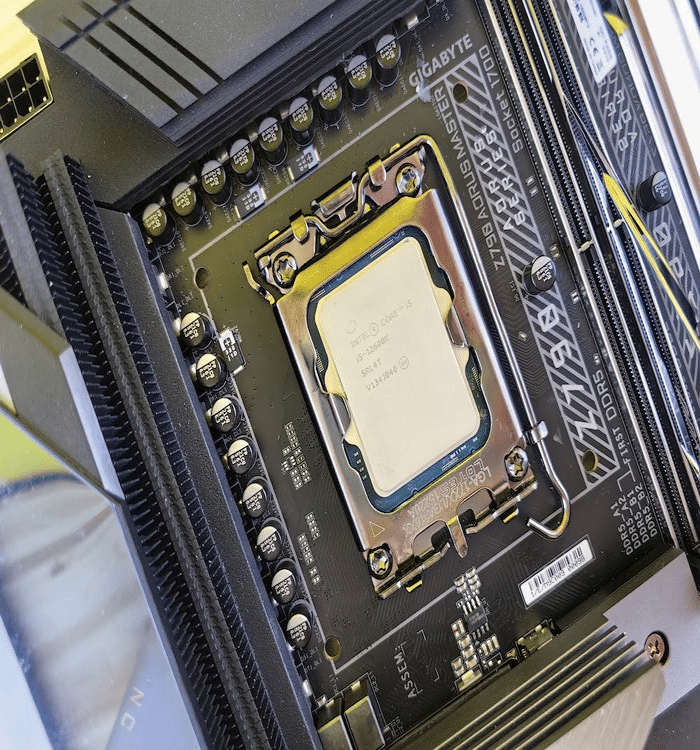
This post provides detailed information on the Intel manufacturing technician job description, including the key duties, tasks, and responsibilities they commonly perform.
It also highlights the major requirements you may be expected to fulfill to be hired for the Intel manufacturing technician role.
What Does an Intel Manufacturing Technician Do?
An Intel manufacturing technician works in semiconductor fabrication plants (aka “fabs”), maintaining the complex machinery and processes involved in chip production.
They ensure equipment used in lithography, deposition, etching, doping, cleaning, quality control, and other processes to make integrated circuits runs smoothly with minimal downtime.
Intel techs report to process engineers or shift supervisors within the fab. More senior technicians may lead teams working across multiple pieces of equipment.
Jobs are concentrated in Intel’s nationwide network of fabrication facilities located in sites like Arizona, New Mexico, Oregon, Ireland, Israel and China. Cleanroom environments are standard.
An Associate degree in electronics/electromechanical engineering is preferred along with semiconductors processing technician certification.
Ongoing skills training is provided including statistical process control (SPC).
The Intel manufacturing technician job description involves routine maintenance procedures, diagnosing and fixing tool breakdowns, data collection/analysis, sustaining uptime metrics, collaborating with cross-functional teams like facilities and vendors, safety protocol enforcement, and training junior technicians.
Regulatory bodies include state and federal occupational health and safety administrations, as well as industry organizations like the Semiconductor Industry Association setting best practices.
Employers require strong electronic and mechanical expertise, computer abilities, attention to detail, communication skills, and the motivation to work flexible shifts sustaining 24/7 semiconductor manufacturing operations.
Intel Manufacturing Technician Job Description Example/Sample/Template
The Intel manufacturing technician job description consists of the following duties, tasks, and responsibilities:
- Monitor processing equipment sensors, controls and indicators to ensure specifications are met and identify potential abnormalities
- Perform scheduled preventive maintenance procedures including inspecting, testing, cleaning and lubricating equipment
- Diagnose electronics, mechanical, pneumatic, hydraulic and computer problems on complex fabrication tools
- Repair or replace defective components and assemblies following safety protocols
- Qualify newly installed tool sets by running dummy wafers until specifications are met
- Support process optimization activities by adjusting equipment parameters as needed
- Collect production and test data, analyze results and recommend changes to improve yield
- Communicate pending maintenance issues, output falls or breakdowns to supervisors and engineers
- Document all standard operating procedures, maintenance logs, parameters, faults and corrective actions accurately
- Isolate sources of downtime to meet overall equipment effectiveness (OEE) goals
- Coordinate with facilities groups and external vendors for tool relocations, installations and upgrades
- Assist with inventory management of spare parts, consumables and other fab materials
- Coach and mentor entry-level manufacturing technicians on procedures
- Maintain cleanroom integrity by following contamination control best practices
- Participate in safety inspections and drills including wearing bunny suits and masks
- Attend certification courses and qualify on new tools as assigned
- Support process evolution by constructing pilot tools with next-generation technologies
- Map out maintenance workflows using statistical tools like failure modes and effects analysis
- Perform chemical handling including mixing, delivery and waste disposal
- Test emergency response systems including toxic gas monitoring, fire suppression, earthquake drills and emergency shut-offs
- Participate in sustainability initiatives around energy, emissions and water usage
- Identify and implement improvements via the 5S methodology (sort, straighten, shine, standardize, sustain)
- Act as an escalation point between process teams and equipment vendors
- Complete all documentation thoroughly and accurately per company guidelines
- Follow safety, compliance and ethical guidelines at all times.
Intel Manufacturing Technician Job Description for Resume
If you have worked previously in the role of an Intel manufacturing technician or are presently working in that position and are making a new resume or CV, then you can create a compelling Professional Experience section for your resume by applying the sample Intel manufacturing technician job description presented above.
You can highlight the major duties and responsibilities you have carried out or are currently performing as an Intel manufacturing technician in your resume’s Professional Experience by utilizing the ones in the Intel manufacturing technician job description above.
This will show to the recruiter/employer that you have been successful performing the Intel manufacturing technician role, which can boost your chances of being hired for the new job that you are seeking, especially if it requires someone with some Intel manufacturing technician work experience.
Intel Manufacturing Technician Requirements: Skills, Knowledge, and Abilities for Career Success
To execute the responsibilities of an Intel manufacturing technician effectively, candidates should possess the following qualifications, which are also usually required for candidates to have to be hired for the role:
- In-depth knowledge of semiconductor processing equipment including robotics, PLCs, vacuums, valves, sensors and lasers
- Skilled with diagnostic and test equipment (oscilloscopes, multimeters, wafer probers, etc.)
- Proficiency in electronics, electro-mechanical systems, pneumatics, hydraulics, optics and computer controls
- Programming ability for equipment HMI, APC, SCADA and statistical analysis software
- Strong computer skills including Microsoft Office, databases, statistical analysis tools and proprietary Intel systems
- Manual dexterity and fine motor skills for intricate component repairs
- Analytical and troubleshooting aptitude to debug complex interdisciplinary issues
- Attention to detail and pattern recognition to prevent extended equipment downtime
- Ability to read schematics, blueprints, maintenance manuals and SOPs
- Clear verbal and written communication to grave shift handoffs, document issues, and guide repairs
- Collaborative teamwork across groups like process engineering and quality control
- Listening and interpersonal abilities to train peers and interface with vendors
- Comfort working in a hazardous production environment donning PPE
- Willingness to work flexible shifts to provide 24/7 support
- High motivation to meet production KPIs like tool availability and cycle times
- Lifelong learning to keep current on the latest industry advances.
Certification in semiconductor handling protocols, automated systems, and electronics are preferred but Intel provides on-the-job training to develop well-rounded manufacturing technicians as well.
Intel Manufacturing Technician Salary
It turns out the average pay for Intel Manufacturing Technicians in 2022 was around $88,190, according to the government records – US Labor and Statistics.
As for particular states, California techs dominated with an average of $122,340! Oregon and Arizona weren’t far behind at over $121,120 and $119,980.
And New Mexico and Utah rounded out the top 5, coming in at $118,860 and $117,740 respectively on average.
So all in all, getting into high-tech manufacturing with Intel looks like a pretty sweet gig, especially if you’re willing to work in states like California or Oregon.
You’ve got a good shot at making six figures if you stick with it long enough and land one of those senior roles. Not bad at all.
Conclusion
Intel manufacturing technicians play a vital role in producing the chips powering our modern digital world.
Without these skilled individuals inspecting equipment, troubleshooting issues, changing parts, and optimizing processes, Intel’s factories would come to a grinding halt.
As we have seen, those attracted to hands-on electrical, mechanical, and systems-based work can find challenging, well-compensated careers as Intel techs.
Responsibilities run the gamut from preventative maintenance to sustaining production-level efficiency rates.
While an Associate’s degree in electronics or electro-mechanical engineering is preferred, on-the-job training teaches the proprietary skills to qualify on Intel’s cutting-edge semiconductor tools.
Strong candidates possess technical aptitude, communication abilities, focus, and continual learning habits.
With Intel investing billions expanding fabs across the U.S., job security and earning potential look bright in states like Oregon, New Mexico, Arizona for those pursuing semiconductor processing technician roles.
Salaries exceeding $70K are attainable with in-demand expertise.
If you are looking for an essential career allowing you to utilize your mechanical abilities while surrounded by advanced technology, consider becoming a manufacturing technician at innovative companies like Intel.
It’s challenging work that delivers immense pride supporting innovations improving lives globally.
This post provides detailed job description for the Intel manufacturing technician role, which is useful to individuals interested in the career.
They will be able to learn all they need to know about the duties and responsibilities Intel manufacturing technicians commonly carry out, to be sure that’s the job they want to do.












